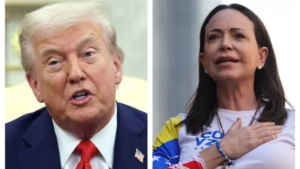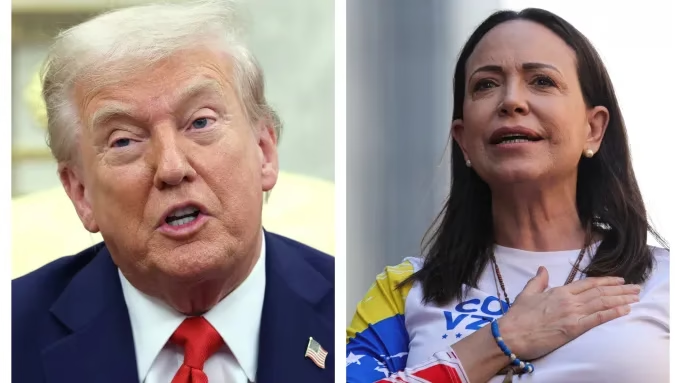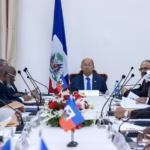President Trump will have to wait a little longer before claiming the Nobel Peace Prize he campaigned for so vigorously.
This year, the prestigious award was given to María Corina Machado, the leading figure of Venezuela’s democratic opposition, recognized for “her struggle to achieve a just and peaceful transition from dictatorship to democracy.”
Announced in Oslo on October 10, the Norwegian Nobel Committee’s decision surprised observers who expected Donald Trump—a nominee after his role in the Gaza cease-fire—to win. Yet the committee chose “the extraordinary civic courage” of Machado, a symbol of Venezuela’s fight for democracy for over two decades, reinforcing the importance of long-term resistance.
“Machado’s tireless work to defend the democratic rights of the Venezuelan people is one of the most remarkable examples of civilian courage seen in Latin America in recent years,” the committee said in its statement.
At 58, Machado—an industrial engineer and former National Assembly member—remains among the most determined critics of the Chavista regime. Her repeated defiance of President Nicolás Maduro, Hugo Chávez’s successor, led to arrest, attacks, and bans from political life. In 2024, expected to lead the opposition, she was disqualified; therefore, she backed Edmundo González Urrutia, whom the opposition claimed had won the election. The government declared Maduro victorious with 51%, sparking mass protests that were violently repressed.
Facing death threats, Machado went into hiding but refused to leave Venezuela. Speaking to NPR at the time, she said:
“I trust the Venezuelan people. I have no doubt that the result of our fight will be the liberation of Venezuela. Maduro is totally isolated, weaker than ever. And our people want and need to know that I’m here with them.”
For the Nobel Committee, her perseverance despite persecution and isolation symbolizes “the flame of democracy that continues to burn in the growing darkness of authoritarian Venezuela.”
In a video posted on the Nobel Prize website, a visibly emotional Machado reacted to the news:
“Oh my God, I have no words. I am just one person. I certainly do not deserve this. It is the achievement of a whole society.”
Disappointment in Washington
The decision left the White House disappointed. President Donald Trump, a frequent but unsuccessful Nobel contender, had hoped that his Middle East diplomacy might finally earn him the distinction.
“They will never give me the Nobel Peace Prize. I deserve it, but they will never give it to me,” he said earlier this year.
According to Kate Bartlett of Voice of America, betting markets had Trump as the frontrunner, ahead of Sudan’s Emergency Response Rooms, a humanitarian network aiding civilians amid civil war. But the committee reportedly favored “sustained peace efforts” over “quick political victories.”
The White House communications director, Steven Cheung, condemned the decision on X (formerly Twitter), calling it “a political choice.”
“The Nobel Committee once again proves it puts politics over peace,” he wrote. “President Trump will continue making peace deals, ending wars, and saving lives. He has the heart of a humanitarian.”
Ironically, the new Nobel laureate and President Trump are unexpectedly linked. In August 2025, Machado publicly thanked Washington after the Trump administration announced a $50 million bounty for President Maduro’s arrest.
Although they come from different political arenas, Machado acknowledged Trump’s support for Venezuela’s opposition. “We are very grateful to President Trump for his decisive action toward freedom in Venezuela,” she told Fox News as reported by NPR.
Since returning to the White House, Trump has made Venezuela a central focus of his regional agenda. The U.S. military has carried out four strikes in the Caribbean targeting boats allegedly transporting narcotics — three of which reportedly departed from Venezuelan ports, according to the Pentagon. Caracas has denounced the operations as “destabilization disguised as counternarcotics enforcement.”
For many observers, awarding the Nobel Prize to María Corina Machado goes beyond honoring an individual—it’s a recognition of Venezuela’s broader democratic struggle.
Despite threats, bans, and internal exile, Machado embodies the country’s ongoing resistance against authoritarianism, underscoring the prize’s focus on steadfast democratic commitment.
As the Norwegian Nobel Committee put it, she “carries the voice of a silenced people” and “keeps the democratic flame alive.”
This global acknowledgment has energized Venezuela’s opposition and affirmed for the world that sustained democratic resistance remains vital—even when immediate change isn’t achieved.
Sources: Voice of America, NPR, Fox News, Associated Press (October 10, 2025).







